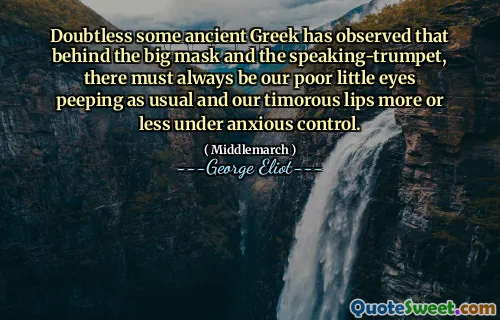
There had to be a reason why they were not going to marry. They had both been so adamant about it. What the devil was the reason?
This quote reveals a tension rooted in the characters' firm decisions not to marry, despite mutual determination and perhaps complex underlying motivations. It captures a moment of curiosity and introspection, hinting that their steadfastness may conceal deeper issues, conflicting feelings, or societal pressures. The phrase "What the devil was the reason?" conveys a mix of frustration and intrigue, emphasizing that external or internal factors may influence their choices beyond mere stubbornness.
The reflection on such a situation invites consideration of the often hidden intricacies in relationships and personal decisions. Sometimes, individuals possess clear reasons for their choices, but at other times, these reasons are clouded by emotions, fears, or social expectations. The acknowledgment that they both remained adamant suggests a shared understanding or shared denial of the underlying problem.
The context in which this quote exists hints at a story where characters are caught amid societal norms of marriage, personal aspirations, or perhaps secret conflicts. It opens a narrative window into examining whether their resolve is genuine or a facade covering unresolved issues or vulnerabilities.
Furthermore, this quote resonates because it echoes the human tendency to question decisions that are firmly set, especially when circumstances or motivations are opaque. It mirrors real-life situations where we see people obstinately sticking to opinions or choices, driven by reasons known too well only to themselves or unable to confront the true basis behind their resistance.
In a broader sense, it explores themes of love, obligation, societal judgment, and personal growth. It reminds readers that behind every firm stance, there might be a story worth uncovering—challenging us to look beyond surface appearances to better understand human complexity.
In the literary context, such a moment likely serves as a pivotal point, urging characters or readers to ponder what truly lies at the heart of decisions that seem rational but may be deeply emotional or subconscious.
Overall, this snippet encapsulates the nuanced conflict between societal expectations and personal desire, illustrating that often, the reasons we refuse to act are as complex and compelling as those that motivate us to act.
Book: ( Slightly Scandalous )
Author: ---Mary Balogh---


